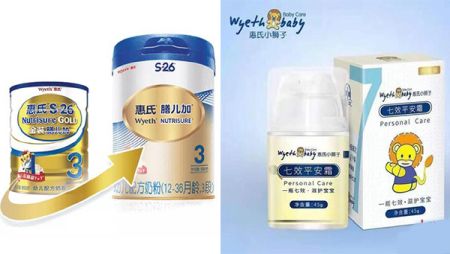With intensified competition in the Chinese dairy market and changes in consumer demand, the intellectual property rights of well-known dairy suppliers have become the main targets of infringement.
Last January 6th, the Hangzhou Intermediate People's Court has ruled on a trademark infringement and unfair competition dispute between Wyeth LLC and Guangzhou Wyeth Maternal and Child Supplies Co, Ltd. ("Guangzhou Wyeth").
The Court awarded Wyeth LLC with 30.55 Million RMB (~$4.7 million USD) in damages. This is the first IP case in Zhejiang Province to which punitive damages are applied.
Wyeth LLC was incorporated in the United States on February 4, 1926. The company leads in the research, development, manufacturing and marketing of infant milk powder, and is the owner of trademark "Wyeth" and "惠氏" in China.
Since the 1980s, infant formula products using the Wyeth trademark have been sold in the Chinese market, and Wyeth (Shanghai) Trading Co., Ltd. and other affiliated companies are authorized to use the "Wyeth"/"惠氏" trademark in China.
After long-term promotion and use, the "Wyeth" and "惠氏" trademarks have gained a high reputation for infant milkpowder and related products. In 2015, the sales revenue of Wyeth's milk powder business in China exceeded 10 billion yuan.

U.S. Wyeth on left vs. Guangzhou Wyeth on right
According to Wyeth LLC, since 2010, Guangzhou Wyeth has engaged in long-term, large-scale production and sales of infant products with trademarks such as "Wyeth", "惠氏" and "惠氏小狮子 (Wyeth Little Lion)", and filed opportunistic registrations such as "Wyeth" and "惠氏" on goods of toiletries and other categories.
Guangzhou Wyeth was also accused of false propaganda, suggesting its partnership with Wyeth LLC.
Although Guangzhou Wyeth's assigned trademarks were declared invalid and the Supreme Court determined that Guangzhou Wyeth's use of "Wyeth" and "惠氏" had constituted trademark infringement and unfair competition, it continued to use "Wyeth", "惠氏", and "惠氏小狮子 (Wyeth Little Lion)" trademarks on maternal products, and even authorized a number of dealers to sell such products through online avenues.
Wyeth LLC and its affiliates filed a lawsuit with the Hangzhou Intermediate People's Court, requesting that Guangzhou Wyeth and the other five co-defendants to stop trademark infringement and unfair competition, and claiming a punitive compensation of 30 million yuan for economic losses and 550,000 yuan for reasonable expenses.
The Court ascertained that the use of the trademarks "Wyeth", "惠氏", and "惠氏小狮子(Wyeth Little Lion)" by the six defendants on the alleged infringing products, product packaging, brochures and online publicity has constituted the use of trademarks that are identical or similar to Wyeth LLC's registered trademarks on similar goods, which easily confuses the relevant public about the origin of the goods, as well as infringes on the exclusive rights of Wyeth LLC's registered trademarks.
With respect to the amount of compensation, the Court took into consideration that the Wyeth trademark enjoys a high reputation in the industry, the defendants' malicious infringement of the plaintiff's goodwill and brand name was obvious, the scale of the defendants' infringement was serious in terms of time, geographical scope and circumstances.
More importantly, the products involved in the case are closely related to the health and safety of infants and young children.
After calculation the amount of illegal profits of each defendant, the total sum exceeded 10 million yuan. Therefore, the Hangzhou Intermediate Court fully supported Wyeth LLC's claimfor punitive damages.
Dairy products, or the entire food industry, are closely related to consumers' health. In this sense, free-riding of well-known brands does more harm than causing confusion for consumers, which provides the rationale for the application of punitive damages in this case.
We believe that this historic compensation will deter trademark infringement in the food industry and boost foreign brand owners' confidence in China's intellectual property system.
The content of this article is intended to provide a general guide to the subject matter. Specialist advice should be sought about your specific circumstances.


